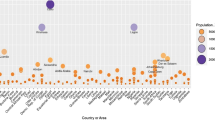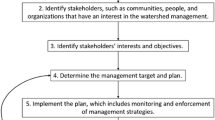Abstract
Climate change is increasingly affecting rural areas worldwide. The Lower Mekong Basin (LMB) is at particular risk due to heat stress, changing rainfall patterns, rising sea levels, and more frequent and extreme climatic events. It is imperative that local-level adaptation plans are developed in a manner that builds resilience to these growing threats. Strategies for developing adaptation plans tend to comprise predominantly science-led or predominantly community-led processes. This study examines an approach that balances inputs from both processes in characterizing community vulnerability as a component of the adaptation planning workflow. Evaluation sites are located within four distinct sub-regions of the LMB: the Vietnam Mekong Delta, the Annamite Mountains of Lao PDR, the Cambodia central lowlands, and the mid-elevation forests of northern Thailand. Our results indicate that by merging science-based data with community-level perspective, knowledge gaps from both sides are filled and a more comprehensive understanding of vulnerability is factored into adaptation planning.


Similar content being viewed by others
Notes
The Lower Mekong Basin also includes a small portion of Myanmar, although that was not the focus of the fieldwork and research discussed in this paper.
Seventy-nine percent of respondents who had observed general changes in climate in the recent years indicated this had occurred in the past 5 years, and 18% indicated change had occurred in the past 10 years.
References
Alexander C, Bynum N, Johnson E, King U, Mustonen T, Neofotis P, Oettle N, Rosenzweig C, Sakakibara C, Shadrin V, Vicarelli M, Waterhouse J, Weeks B (2011) Linking indigenous and scientific knowledge of climate. Bio Sci 61:477–484
Andersson L, Wilk J, Graham LP, Warburton M (2013) Design and test of a model-assisted participatory process for the formulation of a local climate adaptation plan. Clim Dev 5(3):217–228
Bhave AG, Mishra A, Groot A (2013) Sub-basin scale characterization of climate change vulnerability, impacts and adaptation in an Indian River Basin. Reg Environ Chang 13:1087–1098
CGIAR Research Program on Climate Change, Agriculture and Food Security - Southeast Asia (CCAFS SEA). 2016. Assessment report: the drought and salinity intrusion in the Mekong River Delta of Vietnam. Hanoi, Vietnam: CGIAR Research Program on Climate Change, Agriculture and Food Security (CCAFS)
Conway D, Mustelin J (2014) Strategies for improving adaptation practice in developing countries. Nat Clim Chang 4:339–342
Dasgupta P, Morton JF, Dodman D, Karapinar B, Meza F, Rivera-Ferre MG, Toure Sarr A, & Vincent KE (2014) Rural areas. In: Climate Change 2014: Impacts, Adaptation, and Vulnerability. Part A: Global and Sectoral Aspects. Contribution of Working Group II to the Fifth Assessment Report of the Intergovernmental Panel on Climate Change [Field CB, Barros VR, Dokken DJ, Mach KJ, Mastrandrea MD, Bilir TE, Chatterjee M, Ebi KL, Estrada YO, Genova RC, Girma B, Kissel ES, Levy AN, MacCracken S
Dessai S, Hulme M (2004) Does climate adaptation policy need probabilities? Clim Pol 4:107–128
ADB (Asian Development Bank) (2012) Flood damage emergency reconstruction project: preliminary damage and loss assessment. 22 pp
Eastham J, Mpelasoka F, Mainuddin M, Ticehurst C, Dyce P, Hodgson G, Ali R, & Kirby M (2008) Mekong River Basin water resources assessment: impacts of climate change. CSIRO: Water for a Healthy Country National Research Flagship
Finnis J, Sarkar A, Stoddart MCJ (2015) Bridging science and community knowledge? The complicating role of natural variability in perceptions of climate change. Glob Environ Chang 32:1–10
Girvetz EH, Gray E, Tear TH, Brown MA (2014) Bridging climate science to adaptation action in data sparse Tanzania. Environ Conserv 41(2):229–238
Green D, Niall S, Morrison J (2012) Bridging the gap between theory and practice in climate change vulnerability assessments for remote Indigenous communities in northern Australia. Local Environ 17(3):295–315
Gustafson S, Joehl Cadena A, & Hartman P (2016) Adaptation planning in the Lower Mekong Basin: merging scientific data with local perspective to improve community resilience to climate change. Climate and Development. http://dx.doi.org/10.1080/17565529.2016.1223593
Haraguchi M, Lall U (2015) Flood risks and impacts: a case study of Thailand’s floods in 2011 and research questions for supply chain decision making. Int J Disaster Risk Reduction 14(3):256–272
Hijioka Y, Lin E, Pereira JJ, Corlett RT, Cui X, Insarov GE, Lasco RD, Lindgren E & Surjan A (2014) Asia. In: Climate Change 2014: Impacts, Adaptation, and Vulnerability. Part B: Regional Aspects. Contribution of Working Group II to the Fifth Assessment Report of the Intergovernmental Panel on Climate Change [Barros VR, Field CB, Dokken DJ, Mastrandrea MD, Mach KJ, Bilir TE, Chatterjee M, Ebi KL, Estrada YO, Genova RC, Girma B, Kissel ES, Levy AN, MacCracken S, Mastrandrea PR & White, L.L (eds.)] Cambridge University Press, Cambridge, United Kingdom and New York, NY, USA, pp. 1327-1370
Johnston R, Hoanh C.T, Lacombe G, Noble A, Smakhtin V, Suhardiman D, Kam S.P & Choo P.S (2009) Scoping study on natural resources and climate change in Southeast Asia with a focus on agriculture. Report prepared for the Swedish International Development Cooperation Agency by International Water Management Institute, Southeast Asia (IWMI-SEA). Vientiane, Laos: International Water Management Institute, South East Asia Office (IWMI-SEA). 118p
Jones R.N, Patwardhan A, Cohen S.J, Dessai S, Lammel A, Lempert R.J, Mirza M.M.Q & von Storch H (2014) Foundations for decision making. In: Climate Change 2014: Impacts, Adaptation, and Vulnerability. Part A: Global and Sectoral Aspects. Contribution of Working Group II to the Fifth Assessment Report of the Intergovernmental Panel on Climate Change [Field C.B, Barros V.R, Dokken D.J, Mach K.J, Mastrandrea M.D, Bilir T.E, Chatterjee M, Ebi K.L, Estrada Y.O, Genova R.C, Girma B, Kissel E.S, Levy A.N, MacCracken S, Mastrandrea P.R & White L.L (eds.)] Cambridge University Press, Cambridge, United Kingdom and New York, NY, USA, pp. 195-228
Kates RW, Travis W.R & Wilbanks TJ (2012) Transformational adaptation when incremental adaptations to climate change are insufficient. Proceedings of the National Academy of Sciences of the United States of America, 109, 7156-7161.
Khim L, Phearanich H (2012) Climate resilience in rural Cambodia: adaptation mainstreaming, water resource management and agricultural practice. Asian J Environ Disaster Manag 4(4):447–468
Lemos MC, Kirchhoff CJ, Ramprasad V (2012) Narrowing the climate information usability gap. Nat Clim Chang 2:789–794
Mainuddin M, Hoanh CT, Jirayoot K, Halls AS, Kirby M, Lacombe G & Srinetr V (2010) Adaptation options to reduce the vulnerability of Mekong water resources, food security and the environment to impacts of development and climate change. CSIRO: Water for a Healthy Country National Research Flagship. 152 pp
Mastrandrea MD, Heller NE, Root TL, Schneider SH (2010) Bridging the gap: linking climate-impacts research with adaptation planning and management. Clim Change 100:87–101
Mekong River Commission (MRC) (2009) Adaptation to climate change in the countries of the Lower Mekong Basin: regional synthesis report. MRC Technical Paper No. 24. Mekong River Commission, Vientiane. 89 pp
Mimura N, Pulwarty R.S, Duc D.M, Elshinnawy I, Redsteer M.H, Huang H.Q, Nkem J.N & Sanchez Rodriguez R.A (2014) Adaptation planning and implementation. In: Climate Change 2014: Impacts, Adaptation, and Vulnerability. Part A: Global and Sectoral Aspects. Contribution of Working Group II to the Fifth Assessment Report of the Intergovernmental Panel on Climate Change [Field CB, Barros VR, Dokken DJ, Mach K.J, Mastrandrea M.D, Bilir T.E, Chatterjee M, Ebi K.L, Estrada Y.O, Genova R.C, Girma B, Kissel E.S, Levy A.N, MacCracken S, Mastrandrea P.R & White L.L (eds.)] Cambridge University Press, Cambridge, United Kingdom and New York, NY, USA, pp. 869-898.
MONRE (2009) Climate change, sea level rise scenarios for Vietnam. Prepared by the Vietnam Ministry of Natural Resources and Environment. 34 pp
Nara P, Mao G, Yen T (2014) Climate change impacts on agricultural products in Thailand: a case study of Thai rice at the Chao Phraya River Basin. APCBEE Procedia 8:136–140
Nguyen Q, Hoang MH, Öborn I, van Noordwijk M (2013) Multipurpose agroforestry as a climate change resiliency option for farmers: an example of local adaptation in Vietnam. Clim Change 117:241–257
Pringle P, Conway D (2012) Voices from the frontline: the role of community-generated information in delivering climate adaptation and development objectives at project level. Clim Dev 4(2):104–113
Rasanen TA, Kummu M (2013) Spatiotemporal influences of ENSO on precipitation and flood pulse in the Mekong River Basin. J Hydrol 476:154–168
Rasanen TA, Lehr C, Mellin I, Ward PJ, Kummu M (2013) Palaeoclimatological perspective on river basin hydrometeorology: case of the Mekong Basin. Hydrol Earth Syst Sci 17:2069–2081
Shaffer LJ (2014) Making sense of local climate change in rural Tanzania through knowledge co-production. J Ethnobiol 34(3):315–334
Smajgl A, Toan TQ, Nhan DK, Ward J, Trung NH, Tri LQ, Tri VPD, Vu PT (2015) Responding to rising sea levels in the Mekong Delta. Nat Clim Chang 5:167–174
Tschakert P (2007) Views from the vulnerable: understanding climatic and other stressors in the Sahel. Glob Environ Chang 17:381–396
USAID (2013) Mekong ARCC Climate Change Impact and Adaptation Study for the Lower Mekong Basin: Main Report. Prepared for the United States Agency for International Development by ICEM - International Centre for Environmental Management. 284 pp
World Bank. (2012). Thai Flood 2011: rapid assessment for resilient recovery and reconstruction planning. 377 pp
Acknowledgements
The authors wish to thank the USAID Mekong Adaptation and Resilience to Climate Change team from DAI for their competent management of the project, and partners the Asian Management Development Institute, International Union for Conservation of Nature, and World Food Programme for their work on the ground with the pilot communities. Further thanks go to Shannon Dugan of DAI, Dr. Alex Smajgl of Mekong Region Futures Institute, and Henry Tucker of Lao Consulting Group for their insightful reviews of and suggestions for this article. We also thank Simon Tilleard from the International Centre for Environmental Management for providing clarifications on climate modeling methods. Finally, we thank the community members of Thuan Hoa Commune, Ban Kouane and Ban Xong, Chey Commune, and Huai Kang Pla Village for their participation, openness, and valuable input throughout the pilot project.
This publication has been made possible by the support of the American People through the United States Agency for International Development (USAID). The contents of this document are the sole responsibility of the authors and do not necessarily reflect the views of USAID or the US Government.
Author information
Authors and Affiliations
Corresponding author
Additional information
This article is part of a Special Issue on “Climatic Change and Development in the Mekong River Basin” edited by Jaap Evers and Assela Pathirana.
Electronic supplementary material
Below is the link to the electronic supplementary material.
ESM 1
(DOCX 158 kb)
Rights and permissions
About this article
Cite this article
Gustafson, S., Joehl Cadena, A., Ngo, C.C. et al. Merging science into community adaptation planning processes: a cross-site comparison of four distinct areas of the Lower Mekong Basin. Climatic Change 149, 91–106 (2018). https://doi.org/10.1007/s10584-016-1887-7
Received:
Accepted:
Published:
Issue Date:
DOI: https://doi.org/10.1007/s10584-016-1887-7




